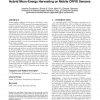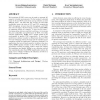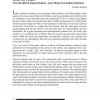MOBISYS
2010
ACM
15 years 16 days ago
2010
ACM
MOBISYS
2010
ACM
15 years 4 months ago
2010
ACM
Most current methods for 802.11-based indoor localization depend on surveys conducted by experts or skilled technicians. Some recent systems have incorporated surveying by users. ...
124
click to vote
MOBISYS
2010
ACM
15 years 4 months ago
2010
ACM
Location-based applications have become increasingly popular on smartphones over the past years. The active use of these applications can however cause device battery drain owing ...
121
click to vote
MOBISYS
2010
ACM
15 years 4 months ago
2010
ACM
Mobile sensing is difficult without power. Emerging Computational RFIDs (CRFIDs) provide both sensing and generalpurpose computation without batteries--instead relying on small ca...
150
click to vote
MOBISYS
2010
ACM
15 years 4 months ago
2010
ACM
We investigate if WiFi access can be used to augment 3G capacity in mobile environments. We first conduct a detailed study of 3G and WiFi access from moving vehicles, in three dif...
108
click to vote
MOBISYS
2010
ACM
15 years 4 months ago
2010
ACM
Many emerging smartphone applications require position information to provide location-based or context-aware services. In these applications, GPS is often preferred over its alte...
128
click to vote
MOBISYS
2010
ACM
15 years 4 months ago
2010
ACM
We present Darwin, an enabling technology for mobile phone sensing that combines collaborative sensing and classification techniques to reason about human behavior and context on ...
128
click to vote
MOBISYS
2010
ACM
15 years 4 months ago
2010
ACM
Energy management is a critical issue for mobile devices, with network activity often consuming a significant portion of the total system energy. In this paper, we propose Catnap,...
MOBISYS
2010
ACM
15 years 4 months ago
2010
ACM
121
click to vote
MOBISYS
2010
ACM
15 years 4 months ago
2010
ACM
We build an efficient and reliable data transport protocol on top of the Short Message Service (SMS). We conduct a series of experiments to characterize SMS behaviour under bursty...




